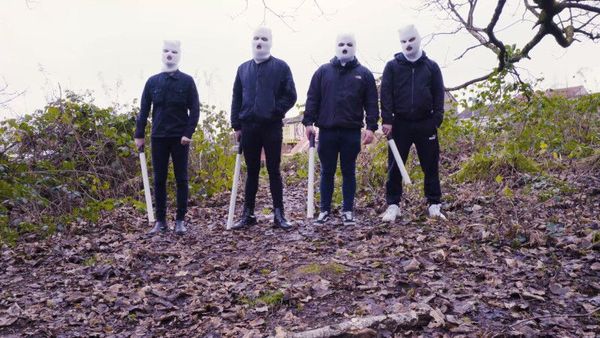Eye For Film >> Movies >> Angry Young Men (2022) Film Review
Angry Young Men
Reviewed by: Jennie Kermode

It has to be said, making a film is much tougher than most people realise. That’s especially true if one is working with non-professionals on a very low budget. It’s a fine thing that there are organisations out there devoted to nurturing up-and-coming filmmakers and increasing the diversity of communities represented onscreen. Sometimes, though, a film comes through which is just bad, and one gets the feeling that it has been promoted beyond its ability by some well-meaning supporter who has neglected to consider the consequences. Having this première to cinema audiences in this state ultimately does nobody any favours.
There’s a decent idea here (albeit not an original one), which is to consider the internecine warfare between gangs of young men on Scottish housing estates as a western. The narrative framing is simple enough, and some effort has been made to adopt the style, on and off, with long, low-angled shots along roadways, and men trying to stare each other down. A bit more patience and consistency with this might have paid off, but scrappy editing does it no favours, and the repetitive soundtrack doesn’t so much speak to the smouldering potential for violence as incite, in the viewer, a desire to do violence to the speakers it’s emerging from.

Our heroes, or at least the characters we are first introduced to, are the Bramble Boys, cute when they’re just weans having a scrap but (as the film acknowledges) not so impressive when they’re all grown up and still patrolling their territory wearing camo gear and looking for fights with anyone who might be offering. They receive an offer they can’t refuse when new gang the Campbell Group takes an interest in the area, wanting control of the drugs trade and the flimsy bit of power that goes with it. Soon things escalate between the two gangs and others from neighbouring areas, and the fact that nobody onscreen can swing a punch properly gets lost in wildly circulating rumours about murder, treachery and the crossing of lines both physical and metaphorical.
There’s a surreal edge to this. The police (quality or otherwise) are nowhere to be seen. They may as well not be for the average young man trying to contend with this stuff in real life, at least as far as his own safety is concerned. Female characters seems to live in a different world, trying to raise children or care for elderly relatives, worried about where money is going to come from. This emphasises the men’s alienation, which gets some attention towards the end in a parody of outlaw tropes.
With a lot more time and support (of the educational rather than just the confidence-boosting variety), something might have been made of this. A decent script would have been a start. This one has been crafted almost entirely from the kind of filler material one would normally strip out before production began. Significant actions mostly happen offscreen. More than half the runtime is spent with groups of men sitting around having boring conversations which provide little exposition and tell us nothing about their characters. The fight choreography is abysmal and makes no sense at all, the camera seemingly weaving around at random during action scenes. The lighting is flat. The best that can be said about the actors is that one or two of them are adequate; the less said about the others, the better.
Director Paul Morris is best known for having appeared in Burnsitoun and in many ways this film feels like an extended Burnistoun sketch shorn of wit, observational humour and redeeming irony. One finds oneself longing for somebody to hurl a bottle of ginger into the air just for a moment of excitement. Gang warfare never felt so soporific.
Reviewed on: 11 Mar 2022















